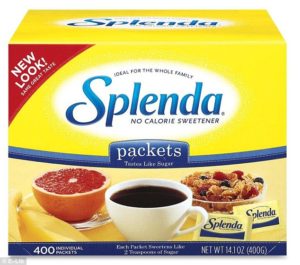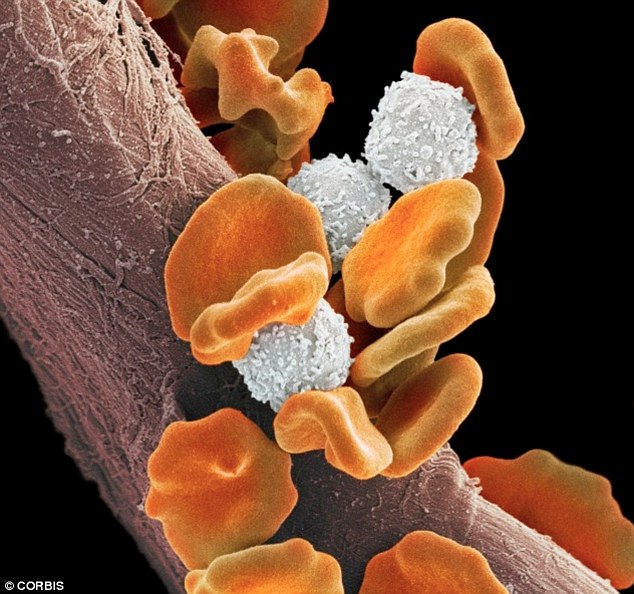An artificial sweetener promoted as a healthier alternative to sugar may raise the risk of leukaemia, a study has found.

‘Cancer-causing’: Sucralose, the artificial sweetener in Splenda, may raise the risk of leukaemia and other cancers, a study has found
Italian researchers found Splenda, a sweetener which containing sucralose, was linked with an increased risk of this type of blood cancer as well as other cancers.
The team, from the Ramazzini Institute, called for ‘urgent’ follow up studies to assess whether the ingredient is harmful.
However, Splenda’s makers, Heartland Food Products Group, issued a strong rebuttal, arguing a body of evidence has found the product to be safe, and calling into question the reliability of studies by the Ramazzini Institute.
And as part of the study, researchers used doses of Splenda that were at least four times the recommended daily limit for humans.
However, one scientist said there is no safe dose, as if a product is cancerous at high doses, it tends to have the same effect even if less of it is consumed.
Splenda was introduced to the market in 1999 as an alternative to other sweeteners which were shown to cause health problems, the news agency UPI reports.
It was also intended to replace sugar, which has been linked with diseases such as obesity and type 2 diabetes.
Sucralose was approved for human consumption in Europe in 2000, after the EU’s Scientific Committee on Food declared it is ‘not harmful to the immune system, does not cause cancer, infertility, pose a risk to pregnancy or affect blood sugar levels’.
Most studies, including those done by the sweetener’s manufacturer, have shown it does not cause cancer.
As part of the new study, the Italian researchers fed 457 male mice and 396 female mice various doses of sucralose.
They doses given were zero, 500, 2,000, 8,000, or 16,000 parts per million (ppm), added to their feed from 12 days of gestation until their death.
As the level of Splenda increased in their diet, so did the rate of malignant cancer in the male mice, the researchers found.
They also found significantly increased incidence of leukemia in the male rodents, especially at 2,000 ppm and 16,000 ppm.
‘These findings do not support previous data that sucralose is biologically inert,’ the researchers wrote in the study.
More studies are ‘necessary’, they said, including an assessment of whether sucralose can cause cancer, they added.
They continued: ‘Considering that millions of people are likely exposed, follow-up studies are urgent.’

Leukaemia: As the level of Splenda consumed rose,so did the rates of blood cancers, researchers found
However, critics have said the study used doses far higher than are recommended for humans.
In an interview, the Italian researchers told Forbes the lowest dose they gave to the mice – 500ppm – equates to around 60 mg of sucralose per kg of body weight.
This is four times higher than the acceptable daily intake for humans, which is 15mg/kg body weight, according to NHS Choices.
“When something causes cancer at high doses, it generally causes cancer at lower doses, the risk is just smaller.” ~ Dr Lisa Lefferts, a scientist at the Center for Science in the Public Interest
However, some researchers said this doesn’t affect the study’s findings, as things that are cancerous at high doses tend to have the same effect at lower doses.
Speaking to EatClean.com, Dr Lisa Lefferts, a scientist at the Center for Science in the Public Interest, said: ‘Even if you consume less, that doesn’t mean there’s no problem. When something causes cancer at high doses, it generally causes cancer at lower doses, the risk is just smaller.’
In a statement, Heartlands Food Products, the US manufacturer of Splenda, said: ‘Health regulatory and food safety authorities have found other studies conducted by the Ramazzini Institute to be unreliable.
‘The group routinely conducts studies using an unconventional design and has been criticized for not following internationally-recognized safety assessment standards.
‘The truth is that the collective scientific evidence strongly supports that sucralose is safe and does not cause cancer.’
It said sucralose has been ‘extensively researched’, with more than 110 studies conducted over a 20-year period. Sucralose was introduced to the market to replace sugar, linked with obesity and type 2 diabetes
‘These studies include rigorous testing to specifically identify any potential for causing cancer,’ it continued.
‘Worldwide regulatory authorities, including the U.S. Food and Drug Administration, the European Food Safety Authority, Health Canada and the World Health Organization, have reviewed these studies and confirm that results show no link between sucralose and cancer.’
It added that low calorie sweeteners like Splenda are ‘effective tools’ consumers can use to reduce their sugar intake.
The study was published in the International Journal of Occupational and Environmental Health.
However studies by the Ramazzini Institute have been criticised in the past. Writing for Forbes in 2012, journalist Trevor Butterworth said: No matter what substance the Institute tests for cancer, the results always seem to be positive, whereas other laboratories testing the same substances repeatedly fail to come up with the same findings.
‘Take aspartame, which the Ramazzini Institute declared carcinogenic in a study it conducted in 2005 and multiple studies thereafter.

‘The European Union’s Food Safety Authority commissioned a panel of experts to examine this study as a matter of high priority, given its alarming findings; its conclusions, however, were devastating.
‘It appeared that many of the rats were sick with chronic lung respiratory disease, which just so happens to cause the same kinds of cancer that Ramazzini attributed to aspartame.’
Written by Madlen Davies for The Daily Mail ~ March 14, 2016.
FAIR USE NOTICE: This site contains copyrighted material the use of which has not always been specifically authorized by the copyright owner. We are making such material available in our efforts to advance understanding of environmental, political, human rights, economic, democracy, scientific, and social justice issues, etc. We believe this constitutes a ‘fair use’ of any such copyrighted material as provided for in section 107 of the US Copyright Law. In accordance with Title 17 U. S. C. Section 107, the material on this site is distributed without profit to those who have expressed a prior interest in receiving the included information for research and educational purposes. For more information go to: http://www.law.cornell.edu/uscode/17/107.shtml“
